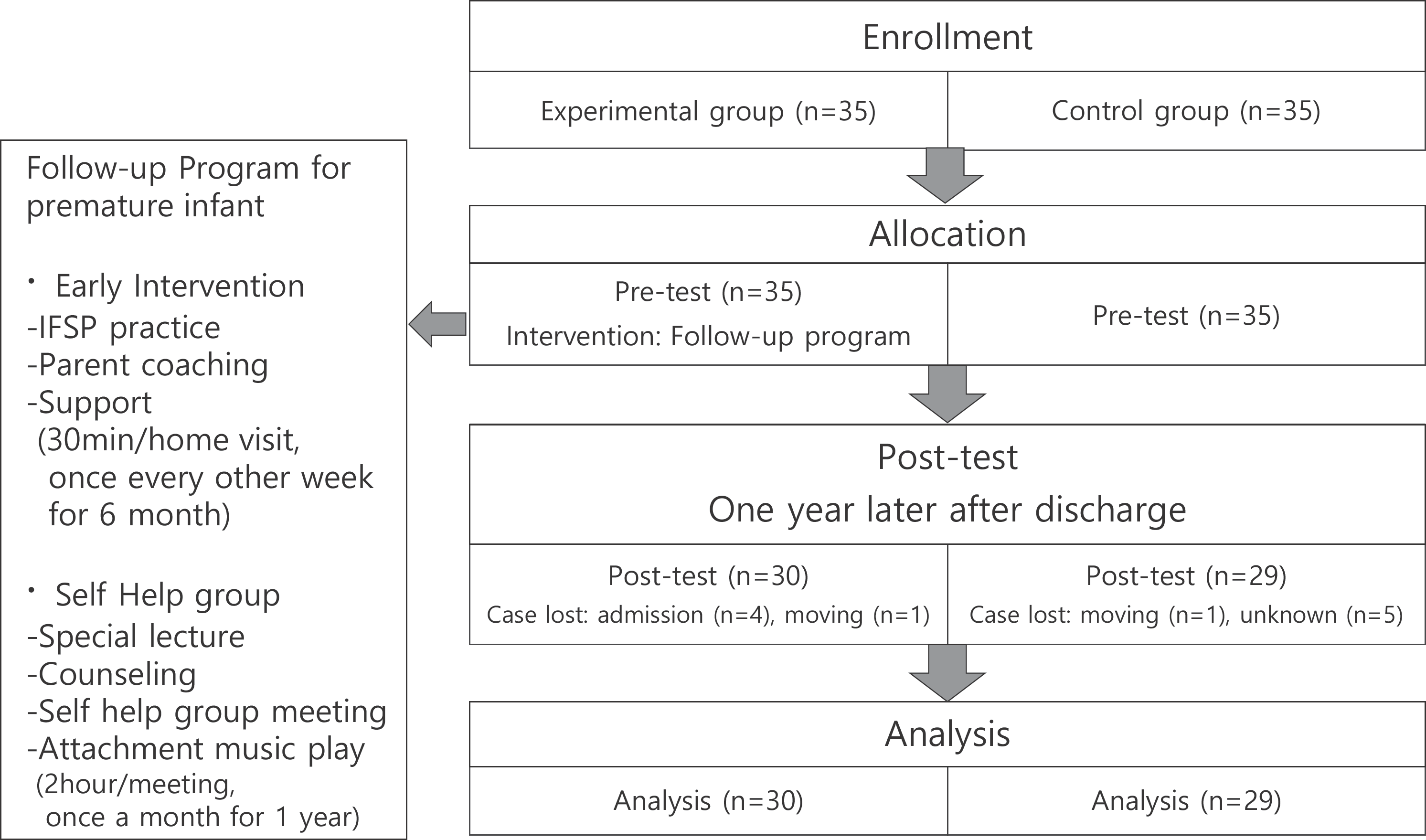Abidin RR. Parenting stress index: manual (PSI). Odessa (FL): Psy-chological Assessment Resources;1995. p. 1–74.
Ahn YM., Lee S. Cognitive ability and related factors in preschoolers born prematurely. Child Health Nurs Res. 2019. 25:468–76.

Bishe MV., Aziznejadroshan P., Mojaveri MH., Hajiahmadi M., Bishe RJ. The effect of home-visit training program on the maternal anxiety of preterm infants: a clinical trial study. Int J Pediatr. 2020. 8:11783–91.
https://doi.org/10.22038/ijp.2020.44964.3705.

Brisch KH., Bechinger D., Betzler S., Heinemann H. Early preventive attachment-oriented psychotherapeutic intervention program with parents of a very low birthweight premature infant: results of attachment and neurological development. Attach Hum Dev. 2003. 5:120–35.

Brown HK., Speechley KN., Macnab J., Natale R., Campbell MK. Mild prematurity, proximal social processes, and development. Pediatrics. 2014. 134:e814–24.

Dusing SC., Tripathi T., Marcinowski EC., Thacker LR., Brown LF., Hendricks-Muñoz KD. Supporting play exploration and early developmental intervention versus usual care to enhance development outcomes during the transition from the neonatal intensive care unit to home: a pilot randomized controlled trial. BMC Pediatr. 2018. 18:46.

Ferreira RC., Alves CRL., Guimarães MAP., Menezes KKP., Magalhães LC. Effects of early interventions focused on the family in the development of children born preterm and/or at social risk: a meta-analysis. J Pediatr (Rio J). 2020. 96:20–38.

Gibaud-Wallston J., Wandersman LP. Development and utility of the Parenting Sense of Competence Scale. Nashville (TN): John F. Kennedy Center for Research on Education and Human Development;1978.
Gray PH., Edwards DM., Gibbons K. Parenting stress trajectories in mothers of very preterm infants to 2 years. Arch Dis Child Fetal Neonatal Ed. 2018. 103:F43–8.

Griffin T., Abraham M. Transition to home from the newborn intensive care unit: applying the principles of family-centered care to the discharge process. J Perinat Neonatal Nurs. 2006. 20:243–9. quiz 250-1.
Han MR., Choi KS. Effects of a refresher program for inactive nurses on nursing professionalism and nursing clinical self-efficacy. J Korean Acad Nurs Adm. 2011. 17:44–53.

Ji ES., Shim KK. Effects of a community-based follow-up program for parents with premature infants on parenting stress, parenting efficacy, and coping. Child Health Nurs Res. 2020. 26:366–75.

Kim H., Epstein NB., Hancock GR., Hurtado GA., Svetaz MV., Allen M. Latent change modeling of Latino parent– child conflict and path-ways to mental health. J Marriage Fam. 2023. 85:518–38.
https://doi.org/10.1111/jomf.12880.

Korfmacher J., Green B., Staerkel F., Peterson C., Cook G., Roggman L, et al. Parent involvement in early childhood home visiting. Child Youth Care Forum. 2008. 37:171–96.
https://doi.org/10.1007/s10566-008-9057-3.

Lundqvist P., Weis J., Sivberg B. Parents' journey caring for a preterm infant until discharge from hospital-based neonatal home care-A challenging process to cope with. J Clin Nurs. 2019. 28:2966–78.

Martínez-Shaw ML., Sánchez-Sandoval Y. Effective stress intervention programs for parents of premature children: a systematic review. Stress Health. 2023. 39:236–54.

Merritt TA., Pillers D., Prows SL. Early NICU discharge of very low birth weight infants: a critical review and analysis. Semin Neonatol. 2003. 8:95–115.

Pace CC., Spittle AJ., Molesworth CM., Lee KJ., Northam EA., Cheong JL, et al. Evolution of depression and anxiety symptoms in parents of very preterm infants during the newborn period. JAMA Pediatr. 2016. 170:863–70.

Puddu M. L'assistenza domiciliare del nato ad alto rischio [Home care for the high-risk newborn infant]. Minerva Pediatr. 2010. 62(3 Suppl 1):11–4.
Scherf RF., Reid KW. Going home: what NICU nurses need to know about home care. Neonatal Netw. 2006. 25:421–5.

Shin SJ. Effects of stress, social support and efficacy on mothers’ parenting behaviors [dissertation]. Seoul (Korea): Yonsei University;1997.
Woo M., Chae SM. The relationship between participating in online parenting communities and health-promoting behaviors for children among first-time mothers: the mediating effect of parental efficacy. J Korean Soc Mater Child Health. 2022. 26:183–93.

Yan T., Hou Y., Deng M. Direct, Indirect, and Buffering Effect of Social Support on Parental Involvement Among Chinese Parents of Children with Autism Spectrum Disorders. J Autism Dev Disord. 2022. 52:2911–23.

Yell ML., Shriner JG., Katsiyannis A. Individuals with disabilities education improvement act of 2004 and IDEA regulations of 2006: implications for educators, administrators, and teacher trainers. Focus Except Child. 2006. 39:1–24.
https://doi.org/10.17161/foec.v39i1.6824.

Zhang R., Huang RW., Gao XR., Peng XM., Zhu LH., Rangasamy R, et al. Involvement of parents in the care of preterm infants: a pilot study evaluating a family-centered care intervention in a Chinese neonatal ICU. Pediatr Crit Care Med. 2018. 19:741–7.





 PDF
PDF Citation
Citation Print
Print




 XML Download
XML Download